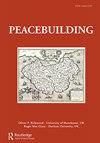Deepening understandings of success and failure in post-conflict reconciliation
IF 1.4
3区 社会学
Q2 INTERNATIONAL RELATIONS
引用次数: 1
Abstract
ABSTRACT Is failure in reconciliation reversible, or does it become over determined at some point? Can signs both of reconciliation and its failures co-exist and survive at different levels of peacebuilding? Should we be thinking in terms of ‘reconciliation’ or even ‘reconciliations’ instead of ‘Reconciliation’ with a Big R? To address these questions, this article stresses the factors that emerge from five case studies: 1) the treatment, definitions and feelings of victims of the conflict; 2) the continuation of violence in new forms; 3) the political power struggles that were left unchanged by the conflict; 4) the lack of political will for change, particularly to structures of economic injustice; 5) divisions between national elites and local populations; 6) the role of external actors; 7) deeply entrenched conflict identities and narratives; and 8) the multi-faceted factor of time in assessing success versus failure..加深对冲突后和解成败的理解
摘要对账失败是可逆的,还是在某个时刻变得过于确定?和解及其失败的迹象能否共存,并在不同级别的建设和平中幸存下来?我们应该从“和解”甚至“和解”的角度来思考,而不是与大R的“和解”?为了解决这些问题,本文强调了五个案例研究中出现的因素:1)冲突受害者的待遇、定义和感受;2) 新形式的暴力继续存在;3) 由于冲突而没有改变的政治权力斗争;4) 缺乏变革的政治意愿,特别是对经济不公正结构的变革;5) 国家精英和当地居民之间的分歧;6) 外部行动者的作用;7) 根深蒂固的冲突身份和叙述;以及8)评估成功与失败的多方面时间因素。。
本文章由计算机程序翻译,如有差异,请以英文原文为准。
求助全文
约1分钟内获得全文
求助全文

 求助内容:
求助内容: 应助结果提醒方式:
应助结果提醒方式:


